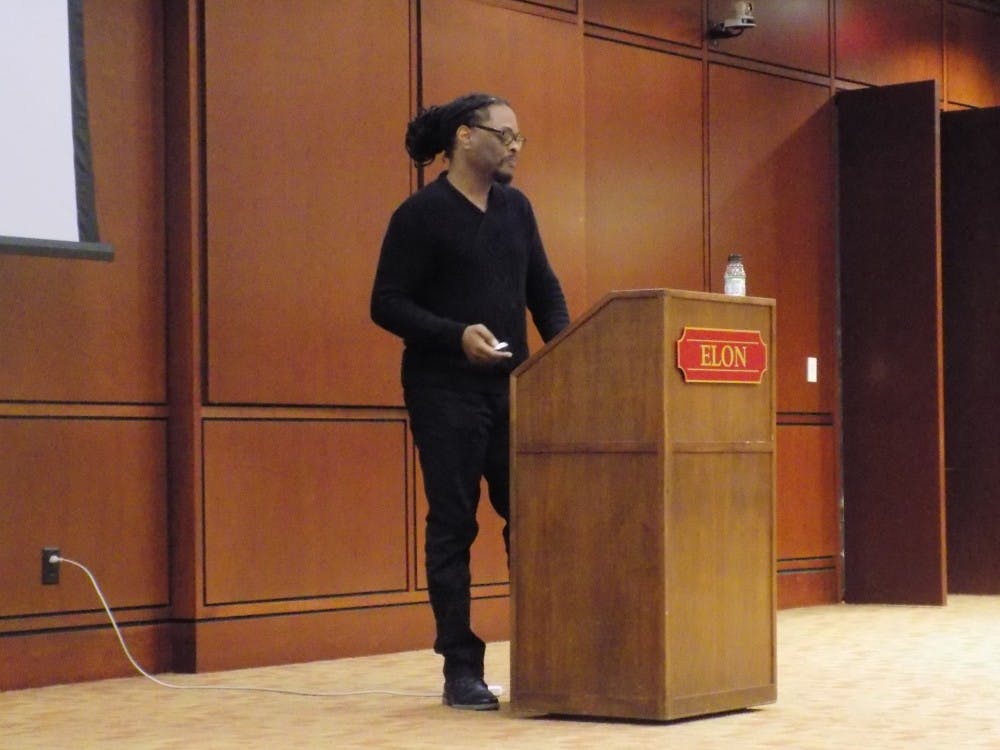It's not often an author begins a presentation by singing the racist recruitment song that made the Sigma Alpha Epsilon chapter at the University of Oklahoma famous via a viral YouTube video.
But that's how Lawrence Ross, author of "Blackballed: The Black and White Politics of Race on America's Campuses," began his speech at 6:30 p.m. Feb. 25 in Elon University's LaRose Digital Theatre. Ross' explanation of the history of the racist song, the university's reaction, Sigma Alpha Epsilon's national response and the subsequent press storm set the tone for the rest of the nearly two-hour-long speech in which Ross dove into the roots and remedies of systematic racism on college campuses, starting with the K-12 school system.
Ross quoted a 2012 Department of Education analysis of K-12 U.S. schools that found that 74 percent of African-American students attend segregated schools. The ratio for Latino students was found to be even higher, at 80 percent.
The same report found an average $75 decrease in the per student spending associated with a 10 percent increase in the percent of non-white students at a school. Ross pointed to these statistics as the root of a system that provides less resources and opportunities — such as SAT prep, after-school programs, health education — for students of color.
According to Ross, obstacles for students of color don't stop when they get to college. From the racist SAE recruitment song to "Affirmative Action bake sales" to statues and buildings memorializing racist historical figures, Ross said students of color at college campuses he visited told him they simply didn't feel safe on campus.
"Every time I [spoke to students], inevitably, students of color were coming up to me and saying, 'You wanna know something? I am not feeling secure on this campus,'" Ross said.
Ross credited that insecure feeling not only to other students but the way administrators react to reported incidents of racial bias. He described the typical response of higher-level administration as a formula: "Three izes equals a miss."
"When there's a campus racism incident, the first thing they do is individualize it," he said. "'This has only happened at this one chapter with these members. Nothing to do with anybody else.'"
The next "izes" in Ross' formula are to "minimize," or discredit evidence as circumstantial, and to "trivialize," or pass the blame onto some external actor. Those three "izes" result in the dismissal of the problem, the "miss" in the formula.
To illustrate this formula in action, Ross told the stories of incidents of racial bias on campuses across the United States, from the well-publicized student protests of the University of Missouri and Yale University to the mysterious and systematic discrimination in the sorority and fraternity bid process at the University of Alabama. Through slide after slide of Instagram posts of racist theme parties and vintage photographs of racist homecoming floats, Ross said the message campus climate sends is clear:
"'You don't belong on campus.' That is the message to students of color," Ross said several times throughout the evening.
The approximately 80 students in attendance met this recurring statement with murmurs of agreement and even applause as the evening progressed.
Ross was invited to speak at Elon by the Office of Fraternity and Sorority Life, who hosted the event in LaRose. Director of Programming for IFC junior Ray Brown, who was in charge of coordinating Ross' visit, said he hoped Elon students could find valuable takeaways from the visiting author.
"The conversation is to always improve," Brown said. "You look 10 or 20 years ago, there have always been steps, but there's always still a problem of race issues. The only way to really go is to keep improving, keep making those steps toward a more inclusive campus."
When asked by an audience member after his talk how students in historically black fraternity and sorority life can make fraternity and sorority culture more inclusive, Ross mirrored Brown's statement.
"[You help by] being straight-up honest about how you feel," Ross said. "How do you stop this culture? Make it unacceptable."


